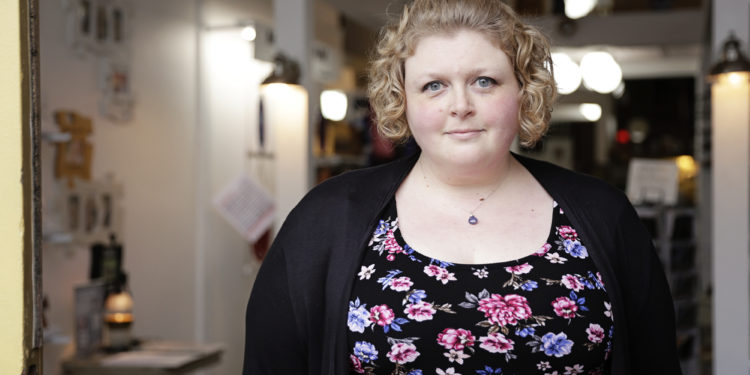“Healing doesn’t always come from a cure.
Sometimes, people find it through acceptance. ”
It’s with a sense of humor and a stubborn nature that Becky Watts has come to accept the diagnosis she received from a neurologist on September 23, 2016.
On that day, Watts learned she had Multiple Sclerosis. She would spend five days in the hospital undergoing steroid treatments to get her severe symptoms under control.
“It was actually such a relief that I didn’t have to keep going the way I was,” she said. “I was so tired trying to make myself do the things I thought I should be doing.”
The diagnosis came after years of experiencing symptoms like fatigue and muscle pain that she explained away as being part of an earlier fibromyalgia diagnosis. According to the Centers for Disease Control, fibromyalgia is a condition that causes pain all over the body, sleep problems, fatigue and sensitivity to pain. What Watts didn’t realize, was that some of her symptoms – legs that didn’t seem to work, severe fatigue, brain fog – were actually the symptoms of a second auto-immune disease.
It wasn’t until her husband started discussing changing to a more affordable insurance plan that had fewer benefits that Watts suggested, “Let’s get my legs checked out first.”
“My husband worked a different shift, and I had done such a good job of masking it, that he didn’t even know there was an issue with my legs,” she said. And that’s what finally led her to a doctor’s visit and seven days later – the multiple sclerosis diagnosis.
According to the National Multiple Sclerosis Society website, nationalmssociety.org, MS is a disease in which the body’s immune system mistakenly attacks myelin – the protective coating around nerve fibers in the central nervous system. Symptoms vary by person and severity but can include fatigue that significantly interferes with the ability to function at home and work, walking difficulty, numbness of the face, body or extremities, a feeling of stiffness, weakness, vision problems, dizziness and vertigo among others.
“MS is really weird, it’s not a constant of one thing,” Watts said. “It’s a little bit of this over here, and a little bit of that over there, and maybe this day it’s not that bad, but on this day taking a shower completely wears you down.”
At the time of her diagnosis, Watts was managing The Candlemaker on the Square store – a position she had held since 2009. Not only did she manage the store – she made the candles herself in the store’s back studio. Candle-making was just one of the things Watts had to give up following her diagnosis, in part because the heat from melting large batches of wax was a trigger for some of her MS symptoms. Her mother now works at the store through the week, and Watts works there on Fridays and Saturdays. The store features the works of local artists – ranging from jewelry to laser cut engravings to paintings. Even though Watts has had to cut back on the hours she works, the store is still an important part of her life.
“The biggest hurdle for me is not the physical – it’s the ‘brain stuff ’,” Watts said on a recent Saturday, standing behind the counter at the Candlemaker on the Square. “I can’t do math like I used to be able to – so I can’t do the bills here anymore. Sometimes I can’t remember things….Which my husband is okay with because he can tell me his stories over and over again and I laugh because it’s like it’s the first time I’ve heard them.”
Watts laughed, tickled at the recollection of her husband repeating his funny stories to her. In fact, Watts laughs a lot – at herself and her disease.
It’s one of the ways she copes, especially on the days when symptoms are severe and she can barely get out of bed. A sense of humor, she said, and stubbornness – are the two keys to helping her manage her daily life.
You have to have a sense of humor about it,” she said. “And my husband says I’m the most stubborn person he’s ever met. You have to be. You have to be a warrior and fight through the symptoms and be able to laugh about it or else you’d just curl up in a ball and die.”
“You have to suck it up and drive on,” she added.
That independence and stubbornness is something she feels she learned from her mom, whose Navy husband would be gone 9-10 months out of the year.
“To be a military wife you had to be strong and independent,” she said. “Your husband was gone a lot of the time so you didn’t wait for a man to do something for you – you did it for yourself.”

“YOU HAVE TO BE A WARRIOR AND FIGHT THROUGH THE SYMPTOMS AND BE ABLE TO LAUGH ABOUT IT OR ELSE YOU’D JUST CURL UP IN A BALL AND DIE. ”
Watts said full spectrum Hemp oil has also helped to lessen some of the pain and fatigue she feels. There have not yet been clinical studies providing conclusive evidence to suggest that CBD is beneficial to people with MS; however, despite the lack of empirical evidence, there does appear to be anecdotal evidence suggesting it may improve symptoms of spasticity and pain. Watts – who also sells the oils in the shop – said it does seem to improve pain for her and is one of the reasons she’s still able to work.
She also uses spoon theory – which is a disability metaphor used to explain the reduced amount of mental and physical energy available for activities. Each activity requires a given number of spoons, which will only be replaced as the person “recharges” through rest. Thinking of her energy in the form of “spoons” helps her to plan for conserving and rationing her energy.
Other than that, she said, “You do what you can on the days that you can. And some days you don’t, because you can’t.”


















